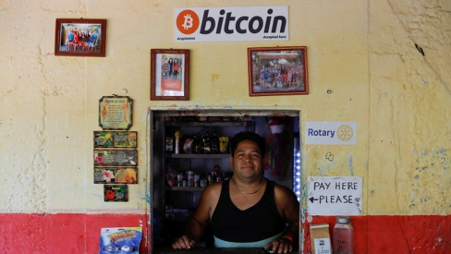The virtual coin was trading near $46,150 as of 6:31 a.m. in New York, having slid as much as 17% a day earlier before paring some of the losses. Some of El Salvador’s citizens protested the move, amid fears that bitcoin’s volatility puts everyday investors at risk and because the poor may not be able to access the technology. There are also concerns about criminal activity and illicit transactions.
Crypto adjacent stocks MicroStrategy and Coinbase also lost about 9% and 4%, respectively. Coinbase users were experiencing delayed or canceled transactions at “elevated rates” in the morning, the company said in an update on Twitter, but those issues were resolved by the afternoon. Major crypto exchanges Kraken and Gemini were also investigating delays and performance issues.
Tuesday’s selloff is the most significant break in a rebound that had lifted Bitcoin almost 75% since late July. Overall cryptocurrency market value fell about $300 billion in the past 24 hours, according to tracker CoinGecko.
Some $3.7 billion of cryptocurrency liquidations occurred over the same period, according to Bybt.com. These happen when leveraged positions are closed by exchanges for failing to meet margin requirements.
Bitcoin adoption met with suspicion
Many people would wonder, why did Bitcoin’s price drop since the adoption by El Salvador is considered to be good news for the cryptocurrency? Well, not everybody believes that this event will positively impact El Salvador’s economy since, more than 1,000 people held a protest against the country’s adoption of bitcoin on Tuesday.
There is concern that by becoming known as a bitcoin haven, the country could attract the wrong kind of investment from criminal groups seeking anonymity,” said Susannah Streeter, senior investment and markets analyst, Hargreaves Lansdown.
The rollout also faced tech issues. Initially, the government-backed digital wallet called Chivo was not available on platforms like Apple (AAPL) and Huawei.
Later, the app could not deal with the high number of user registrations and the government had to take it offline and increase capacity.
While the El Salvador rollout may have been a proximal cause of the swings in Bitcoin, other variables could also be at play in the famously volatile cryptocurrency sector. In particular, the prospect of reduced Federal Reserve stimulus is a challenge for speculative assets like digital tokens.
As part of the new law, businesses will be required to accept bitcoin for goods and services, though merchants who aren’t technologically able to accept bitcoin will be exempt. The government has installed 200 bitcoin ATMs around El Salvador. It also bought 400 bitcoins worth about $20 million and is preloading Chivo wallets with $30 worth of bitcoin for Salvadorans who register.

El Salvador Is Now a Global Bitcoin Laboratory
Some observers see a strange irony in the decision by the Salvadoran government to adopt a digital currency that was designed, in large part, to skirt the traditional controls that governments exercise over money. Others worry that El Salvador is being used as a test subject to advance the agenda of cryptocurrency promoters.
The World Bank and the International Monetary Fund (IMF), see the adoption of Bitcoin by El Salvador as potentially making that country a prime destination for money laundering and other illegal financial activity.
“Without robust anti-money laundering and combating the financing of terrorism measures, cryptoassets can be used to launder ill-gotten money, fund terrorism, and evade taxes,” the IMF warned in a blog post, adding, “This could pose risks to a country’s financial system, fiscal balance, and relationships with foreign countries and correspondent banks.”
Nike just bought a virtual shoe company that makes NFTs and sneakers ‘for the metaverse’
Nike just bought a virtual shoe company that makes NFTs and sneakers ‘for the metaverse’
5 major players building up the Metaverse
5 major players building up the Metaverse
El Salvador plans to create a ‘Bitcoin City’
El Salvador plans to create a ‘Bitcoin City’





